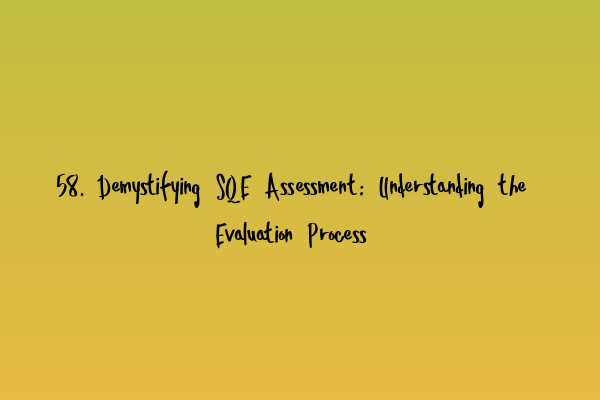Demystifying SQE Assessment: Understanding the Evaluation Process
The Solicitors Qualifying Examination (SQE) is a comprehensive assessment designed to test the knowledge and skills of aspiring solicitors in England and Wales. This new assessment aims to provide a more practical and relevant approach to qualifying as a solicitor. In order to succeed in the SQE, it is important to have a clear understanding of the evaluation process. In this article, we will demystify the SQE assessment and explain how it works.
1. Structure of the SQE Assessment
The SQE assessment is divided into two stages: SQE1 and SQE2. SQE1 focuses on assessing candidates’ functioning legal knowledge, while SQE2 evaluates candidates’ practical legal skills. Let’s take a closer look at each stage:
SQE1
SQE1 consists of two parts, and both parts must be passed in order to progress to SQE2.
Multiple Choice Questions (MCQ): This part of SQE1 tests candidates’ understanding of various areas of law and legal practice. It includes multiple choice questions that assess their knowledge and ability to apply legal principles to different scenarios. To conquer the MCQ section, check out our article on Conquer the Multiple Choice Questions (MCQ) in SQE1.
Legal Research and Writing (LRW): In this part, candidates are required to conduct legal research, analyze and interpret legal materials, and communicate their findings effectively through written responses. It assesses their ability to apply legal principles to practical scenarios. This section tests not only legal knowledge but also the analytical and writing skills of candidates.
SQE2
SQE2 is the final stage of the SQE assessment and focuses on testing candidates’ practical legal skills. It is divided into three parts:
Practical Legal Skills Assessment (PLSA): This part assesses candidates’ practical legal skills, such as interviewing clients, advocacy, legal drafting, and legal research. It is conducted through simulated client interviews and realistic case scenarios. The PLSA tests candidates’ ability to apply legal knowledge to real-life situations. To enhance your problem-solving skills for scenario-based questions in SQE2, read our article on Scenario-Based Questions SQE2: Enhance Your Problem-Solving Skills.
Practical Legal Knowledge (PLK): This part evaluates candidates’ understanding of the practical aspects of legal practice, such as professional conduct, solicitor’s accounts, and will drafting. It focuses on their ability to apply legal knowledge to practical situations.
Legal Research and Writing (LRW): Similar to SQE1, this part assesses candidates’ ability to conduct legal research, analyze legal materials, and communicate effectively through written responses.
2. Evaluation Criteria
The SQE assessment is evaluated based on specific criteria established by the Solicitors Regulation Authority (SRA). These criteria include:
Knowledge and Understanding: Candidates are assessed on their knowledge and understanding of various areas of law and legal practice, as well as their ability to apply this knowledge to practical scenarios.
Legal Analysis and Reasoning: Candidates are evaluated on their ability to analyze complex legal problems, identify relevant legal principles, and apply them to specific situations.
Practical Legal Skills: Candidates’ practical legal skills, including legal research, drafting, and oral communication, are assessed through simulated client interviews and written responses.
3. Recommended Strategies for Success
In order to succeed in the SQE assessment, it is essential to develop effective study and exam strategies. Here are some recommended strategies:
Mastering Time Management: Time management is crucial for completing the assessment within the given timeframe. To learn strategies for efficient exam completion, read our article on Mastering Time Management in SQE: Strategies for Efficient Exam Completion.
Effective Revision Techniques: Creating a study plan and using effective revision techniques can greatly improve your chances of success. To master effective revision techniques for SQE, check out our article on Mastering Effective Revision Techniques for SQE Success.
Utilize SQE Feedback: Understanding the feedback provided after each assessment is essential for identifying areas for improvement. To extract valuable insights from SQE feedback, read our article on Understanding SQE Feedback: Extracting Valuable Insights.
Conclusion
The SQE assessment is a comprehensive evaluation process that tests the knowledge and skills of aspiring solicitors. By understanding the structure and evaluation criteria of the SQE, and implementing effective study and exam strategies, you can increase your chances of success. If you have any further questions or require assistance in preparing for the SQE assessment, feel free to contact us. Good luck!
